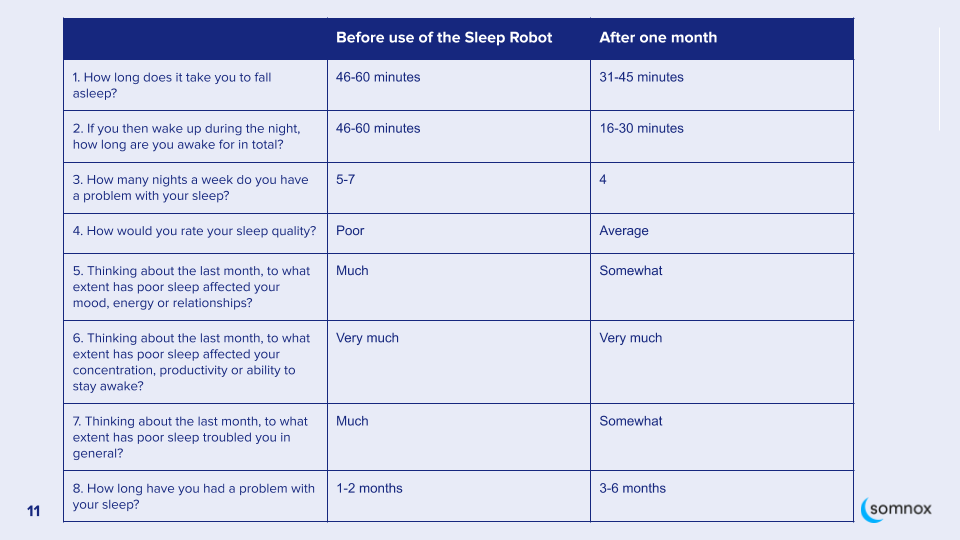Table of Contents
Goal
Somnox has performed research into the efficacy of the Sleep Robot in the third quarter of 2020. The aim of this study was to investigate whether the Sleep Robot would mitigate the participants’ insomnia related sleep problems.
Method
Participants were consumers that bought a new Sleep Robot via one of Somnox’ commercial channels. In total, 24 participants completed the study. They were asked to use the Sleep Robot at home like they normally would. Insomnia related sleep problems were evaluated at three time points: before Sleep Robot use, after two weeks and after a month of robot use (approximately 30 days).
Insomnia related sleep problems were evaluated using the validated SCI questionnaire. This questionnaire consists of eight items:
- How long does it take you to fall asleep?
- If you then wake up during the night, how long are you awake for in total?
- How many nights a week do you have a problem with your sleep?
- How would you rate your sleep quality?
- Thinking about the last month, to what extent has poor sleep affected your mood, energy or relationships?
- Thinking about the last month, to what extent has poor sleep affected your concentration, productivity or ability to stay awake?
- Thinking about the last month, to what extent has poor sleep troubled you in general?
- How long have you had a problem with your sleep?
The SCI questionnaire was sent to new Somnox clients before Sleep Robot use (baseline), after two weeks of Sleep Robot use and after one month of Sleep Robot use. Based upon answers to the questions mentioned above, the SCI score was calculated. This score was representative for the severity of insomnia related sleep problems. The baseline SCI score was compared with the SCI score after two weeks and after one month. Furthermore, the answers to the questions were evaluated separately. Per question, baseline results were compared with results after one month of Sleep Robot use.
Results
SCI score
After two weeks, 42% of participants experienced an improvement of SCI score and after one month this was 71% of participants. Between week 2 and one month, 63% of participants improved their SCI score.
SCI questions separately
After one month of Sleep Robot use, the total time of awakenings during the night improved from 46-60 minutes to 16-30 minutes (question 2). Moreover, the number of nights during which participants experienced sleep problems decreased from 5-7 to 4 (question 3). Participants were more energetic and improved their mood during the day (question 5). Answers to the other questions of the SCI questionnaire are listed in the table below.

Conclusion
Based upon the results of the SCI questionnaire, we can state that the Sleep Robot improves
- the time it takes to fall asleep
- the total time of awakenings during the night
- sleep quality
- energy and mood during the day
Looking at the SCI score overall, 71% of participants improved their score after one month meaning that the Sleep Robot helped mitigate insomnia related sleep problems. Participants experienced the biggest improvement between week two and one month. Thus, Somnox can advise their users to use the Sleep Robot at least for one month to experience sleep improvements. This is in line with other sleep- and behavioural therapies. Future studies must focus on evaluating the effect over a longer period of time.


